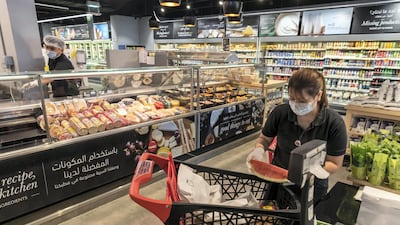A majority of consumers in the UAE and Saudi Arabia are optimistic their economies will rebound within two to three months despite the impact of the Covid-19 pandemic, a new survey from global consultancy McKinsey found.
Seventy-four per cent of consumers in the UAE and 72 per cent in Saudi Arabia are optimistic the economy will grow to become “just as strong or stronger” compared with a global average of 30 per cent, according to the survey that polled Middle East consumer sentiment during the pandemic.
The survey was conducted between January 25 and February 10 and surveyed more than 500 consumers each in the Arab world's two largest economies.
In January, the International Monetary Fund revised its 2021 growth estimate for the global economy to 5.5 per cent, 0.3 per cent higher than its October estimate, on the back of the Covid-19 vaccination drive and support measures put in place by the world's largest economies.
“We see that the big changes of 2020 continue to play out this year: shifting to value and essentials, flight to digital and omni-channel, the move to a homebody economy and shock to loyalty,” Abdellah Iftahy, a partner and leader of the consumer and retail practice at McKinsey Middle East, said on Tuesday.
In China, where the virus originated and new cases have significantly decreased, 58 per cent of survey respondents are optimistic about the country’s economic recovery. In India, 62 per cent are optimistic about an economic recovery despite a recent steep increase in the number of Covid-19 infections.
In the US, where the vaccine programme has gained pace, 41 per cent are optimistic about an economic recovery, while in the UK, only 17 per cent are confident, followed by Spain with 14 per cent and Italy with 13 per cent.
McKinsey’s Middle East survey found that 24 per cent of UAE consumers and 26 per cent of consumers in Saudi Arabia are unsure about the country’s economic recovery.
Only 2 per cent consumers in the UAE and Saudi Arabia said Covid-19 will have a long-lasting impact on the economy and either “show regression or fall into a lengthy recession”.
The survey also assessed consumer behaviours, shopping trends and changes in household income, spending and saving.
In the UAE, 68 per cent of consumers believe their finances will be impacted for four months and more by the Covid-19 pandemic, up from 65 per cent in McKinsey's previous survey on consumer sentiment.
This is reflected in household income, with more than half of UAE consumers saying it has either reduced slightly or reduced a lot, while 40 per cent said it remained the same and 7 per cent said it increased slightly.
Forty-three per cent of respondents said their household spending had fallen, but 30 per cent said it remained the same and 25 per cent said it increased, according to McKinsey.
When it comes to UAE household savings, 60 per cent said it has declined, more than 25 per cent said it was the same and 14 per cent experienced an increase, the survey found.
In Saudi Arabia, 48 per cent of consumers said household income fell and 33 per cent said household spending increased.
“Value and convenience are the primary reason for consumers to spend and try new brands as well as new places to shop,” Mr Iftahy said. “Quality and purpose are also often cited when choosing new brands.”
Nearly half of all UAE consumers are looking for ways to save money while shopping, 47 per cent said they are more mindful of where they spend their money and 46 per cent switched to less expensive products to save money, according to McKinsey.
However, spending on essentials remains at or above pre-Covid-19 levels, with 45 per cent of consumers in the UAE and 40 per cent in the kingdom saying they will lower their spending on discretionary categories.
Meanwhile, the online shopping habits that took hold during the pandemic-induced movement restrictions have become permanent in the UAE, with a 45 per cent increase in consumer intent to spend online even after Covid-19, the survey said.
The McKinsey survey also found that shopping behaviours adopted during the crisis, such as self-checkout and curbside pick-up, are likely to continue in the medium to long term.
Other notable trends during the course of the pandemic have been a shift in brand loyalties and the rise of the “homebody” economy, with 67 per cent of UAE consumers admitting they had not resumed out-of-home activities yet.




